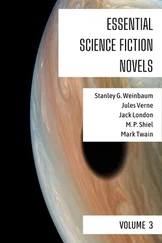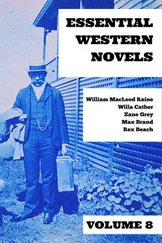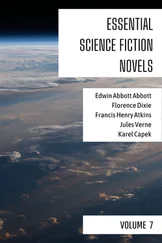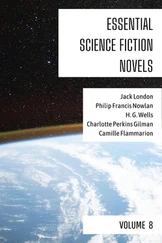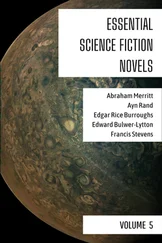This scientific supernaturalism concerns itself with mortal life, not with immortality as do some of the other aspects of the genre . It is concrete in its effects, not spiritual. Its incursions into futurity are earthly, not of heaven or hell, and its problems are of time, not of eternity. The form shows how clear, cold intelligence plays with miracles and applies the supernatural to daily life. The enthusiasm, wild and exaggerated in some ways, that sprang up over the prospects of what modern science and investigation would almost immediately do for the world in the latter half of the nineteenth century, had no more interesting effect than in the stimulating of scientific fictive supernaturalism. And though mankind has learned that science will not immediately bring the millennium, science still exercises a strong power over fiction. This type shows a strange effect of realism in supernaturalism, because of the scientific methods, for supernaturalism imposed on material things produces an effect of verisimilitude not gained in the realm of pure spirit. Too intellectually cold for the purposes of poetry, too abstract and elusive for presentation in drama, and too removed by its association with the fantastic aspects of investigation and the curiosities of science to be very appropriate for tragedy, which has hitherto been the chief medium of expressing the dramatic supernatural, science finds its fitting expression in prose fiction. It is an illustration of the widening range of the supernatural in fiction and as such is significant.
By Karel Čapek
THE ADVERTISEMENT
On New Year’s Day, 1943, G. H. Bondy, head of the great Metallo-Electrical Company, was sitting as usual reading his paper. He skipped the news from the theatre of war rather disrespectfully, avoided the Cabinet crisis, then crowded on sail (for the People’s Journal , which had grown long ago to five times its ancient size, now afforded enough canvas for an ocean voyage) for the Finance and Commerce section. Here he cruised about for quite a while, then furled his sails, and abandoned himself to his thoughts.
“The Coal Crisis!” he said to himself. “Mines getting worked out; the Ostrava basin suspending work for years. Heavens above, it’s a sheer disaster! We’ll have to import Upper Silesian coal. Just work out what that will add to the cost of our manufactures, and then talk about competition. We’re in a pretty fix. And if Germany raises her tariff, we may as well shut up shop. And the Industrial Banks going down, too! What a wretched state of affairs! What a hopeless, stupid, stifling state of affairs! Oh, damn the crisis!”
Here G. H. Bondy, Chairman of the Board of Directors, came to a pause. Something was fidgeting him and would not let him rest. He traced it back to the last page of his discarded newspaper. It was the syllable t i o n, only part of a word, for the fold of the paper came just in front of the t. It was this very incompleteness which had so curiously impressed itself upon him.
“Well, hang it, it’s probably iron production,” Bondy pondered vaguely, “or prevention, or, maybe, restitution. . . . And the Azote shares have gone down, too. The stagnation’s simply shocking. The position’s so bad that it’s ridiculous. . . . But that’s nonsense: who would advertise the restitution of anything? More likely resignation. It’s sure to be resignation.”
With a touch of annoyance, G. H. Bondy spread out the newspaper to dispose of this irritating word. It had now vanished amid the chequering of the small advertisements. He hunted for it from one column to another, but it had concealed itself with provoking ingenuity. Mr. Bondy then worked from the bottom up, and finally started again from the right-hand side of the page. The contumacious “tion” was not to be found.
Mr. Bondy did not give in. He refolded the paper along its former creases, and behold, the detestable tion leaped forth on the very edge. Keeping his finger firmly on the spot, he swiftly spread the paper out once more, and found——Mr. Bondy swore under his breath. It was nothing but a very modest, very commonplace small advertisement:
Invention.
Highly remunerative, suitable for any factory, for immediate sale, personal reasons. Apply R. Marek, Engineer, Břevnov, 1651.
“So that’s all it was!” thought G. H. Bondy. “Some sort of patent braces; just a cheap swindle or some crazy fellow’s pet plaything. And here I’ve wasted five minutes on it! I’m getting scatter-brained myself. What a wretched state of affairs! And not a hint of improvement anywhere!”
He settled himself in a rocking-chair to savour in more comfort the full bitterness of this wretched state of affairs. True, the M.E.C. had ten factories and 34,000 employees. The M.E.C. was the leading producer of iron. The M.E.C. had no competitor as regards boilers. The M.E.C. grates were world-famous. But after thirty years’ hard work, gracious Heavens, surely one would have got bigger results elsewhere. . . .
G. H. Bondy sat up with a jerk. “R. Marek, Engineer; R. Marek, Engineer. Half a minute: mightn’t that be that red-haired Marek—let’s see, what was his name? Rudolph, Rudy Marek, my old chum Rudy of the Technical School? Sure enough, here it is in the advertisement: ‘R. Marek, Engineer.’ Rudy, you rascal, is it possible? Well, you’ve not got on very far in the world, my poor fellow! Selling ‘a highly remunerative invention.’ Ha! ha! ‘. . . for personal reasons.’ We know all about those ‘personal reasons.’ No money, isn’t that what it is? You want to catch some jay of a manufacturer on a nicely limed ‘patent,’ do you? Ah, well, you always had rather a notion of turning the world upside down. Ah, my lad, where are all our fine notions now! And those extravagant, romantic days when we were young!”
Bondy lay back in his chair once more.
“It’s quite likely it really is Marek,” he reflected. “Still, Marek had a head for science. He was a bit of a talker, but there was a touch of genius about the lad. He had ideas. In other respects he was a fearfully unpractical fellow. An absolute fool, in fact. It’s very surprising that he isn’t a Professor,” mused Mr. Bondy. “I haven’t set eyes on him for twenty years. God knows what he has been up to; perhaps he’s come right down in the world. Yes, he must be down and out, living away over in Břevnov, poor chap . . . and getting a living out of inventions! What an awful finish!”
He tried to imagine the straits of the fallen inventor. He managed to picture a horribly shaggy and dishevelled head, surrounded by dismal paper walls like those in a film. There is no furniture, only a mattress in the corner, and a pitiful model made of spools, nails, and match-ends on the table. A murky window looks out on a little yard. Upon this scene of unspeakable indigence enters a visitor in rich furs. “I have come to have a look at your invention.” The half-blind inventor fails to recognize his old schoolfellow. He humbly bows his tousled head, looks about for a seat to offer to his guest, and then, oh Heaven! with his poor, stiff, shaking fingers he tries to get his sorry invention going—it’s some crazy perpetual motion device—and mumbles confusedly that it should work, and certainly would work, if only he had . . . if only he could buy . . . The fur-coated visitor looks all round the garret, and suddenly he takes a leather wallet from his pocket and lays on the table one, two (Mr. Bondy takes fright and cries “That’s enough!”) three thousand-crown notes. (“One would have been quite enough . . . to go on with, I mean,” protests something in Mr. Bondy’s brain.)
“There is . . . something to carry on the work with, Mr. Marek. No, no, you’re not in any way indebted to me. Who am I? That doesn’t matter. Just take it that I am a friend.”
Читать дальше


